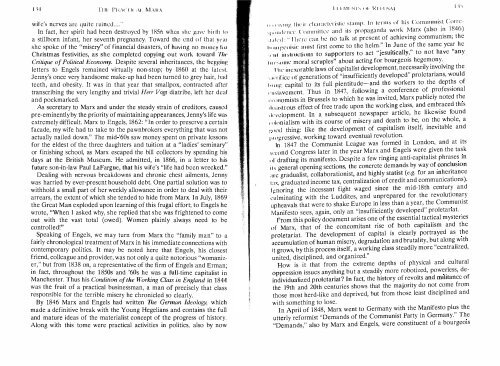CONTENTS - ouroboros ponderosa
CONTENTS - ouroboros ponderosa
CONTENTS - ouroboros ponderosa
Create successful ePaper yourself
Turn your PDF publications into a flip-book with our unique Google optimized e-Paper software.
1 \,1 J'J II " 1':;\( 111 /\1 t\-L\ I .'<br />
wife's nerves an quite ruineu . ... "<br />
In fact, her 'piril had been destroyed hy IH56 when she gave hirlh I"<br />
a stillborn infant, her seventh pregnancy, Toward the end of Ihal y . . al<br />
she spoke of the ((misery" of financial disasters, of havi ng no moncy fUl<br />
Christmas festivities, as she completed copying out work toward '/I",<br />
Cn'lique of Political liconomy. Despite several inheritances, the beggin)!.<br />
letters to Engels remained virtually non-stop; by 1860 at the Iates!.<br />
Jenny's once very handsome make-up had been turned to grey hair, had<br />
teeth, and obesity, It was in that year that smallpox, contracted after<br />
transcribing the very lengthy and trivial Herr Vagt diatribe, left her deaf<br />
and pockmarked.<br />
As secretary to Marx and under the steady strain of creditors, caused<br />
pre-eminently by the priority of maintaining appearances, Jenny's life was<br />
extremely difficult. Marx to Engels, 1862: "In order to preserve a certain<br />
facade, my wife had to take to the pawnbrokers everything that was not<br />
actually nailed down." The mid '60s saw money spent on private lesson,<br />
for the eldest of the three daughters and tuition at a "ladies' seminary"<br />
or finishing school, as Marx escaped the bill collectors by spending his<br />
days at the British Museum. He admitted, in 1866, in a letter to his<br />
future son-in-law Paul LaFargue, that his wife's "life had been wrecked."<br />
Dealing with nervous breakdowns and chronic chest ailments, Jenny<br />
was harried by ever-present household debt. One partial solution was to<br />
withhold a small part of her weekly allowance in order to deal with their<br />
arrears, the extent of which she tended to hide from Marx. In July, 1869<br />
the Great Man exploded upon learning of this frugal effort; to Engels he<br />
wrote, "When I asked why, she replied that she was frightened to come<br />
out with the vast total (owed). Women plainly always need to be<br />
controlled!"<br />
Speaking of Engels, we may turn from Marx the "fami ly man" to a<br />
fairly chronological treatment of Marx in his immediate connections with<br />
contemporary politics. It may be noted here that Engels, his closest<br />
fnend, colleague and provider, was not only a quite notorious "womaniz<br />
er," but from 1838 on, a representative of the firm of Engels and Erman'<br />
in fact, throughout the 1850s and '60s he was a full-time capitalist i<br />
Manchester. Thus his Condition of the Wo rking Class in England in 1844<br />
was the fruit of a practical businessman, a man of precisely that class<br />
responsible for the terrible misery he chronicled so clearly.<br />
By 1846 Marx and Engels had written 1he German Ideology, which<br />
made a definitive break with the Young Hegelians and contains the full<br />
and mature ideas of the materialist concept of the progress of history.<br />
Along with this tome were practical activities in politics, also by now<br />
.,!<br />
"<br />
I 'I I r-,·1 1 r1 1 :. 4 II, I": I 1,1 1






